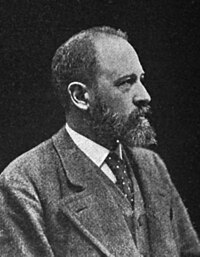Sergei Shevitch: Difference between revisions
tag fix |
Adds content and turns a red category link blue |
||
| Line 6: | Line 6: | ||
==Biography== |
==Biography== |
||
Sergei Shevitch was born in [[Russia]] in approximately 1848.<ref name=Wilshire2>H. Gaylord Wilshire, "The Sequel to a Modern Romance," ''Wilshire's Magazine,'' whole no. 64 (November 1903), pg. 2.</ref> Of noble birth and radical political proclivities, Shevitch married the former [[Helene von Racowitza]], over whom socialist leader [[Ferdinand Lassalle]] lost his life in a [[duel]], and emigrated with her to the United States in 1877.<ref name=Wilshire2 /> |
|||
==Footnotes== |
==Footnotes== |
||
| Line 13: | Line 14: | ||
[[Category:1848 births]] |
[[Category:1848 births]] |
||
[[Category:1910 deaths]] |
[[Category:1910 deaths]] |
||
[[Category: |
[[Category:Revolutionaries who committed suicide]] |
||
Revision as of 01:17, 23 August 2013
This article or section is in a state of significant expansion or restructuring. You are welcome to assist in its construction by editing it as well. If this article or section has not been edited in several days, please remove this template. If you are the editor who added this template and you are actively editing, please be sure to replace this template with {{in use}} during the active editing session. Click on the link for template parameters to use.
This article was last edited by Carrite (talk | contribs) 11 years ago. (Update timer) |

Sergei Shevitch (spelled variously, c. 1848-c. 1910) (Russian: Сергей Шевич) was an ethnic German Russian newspaper editor and socialist political activist. As editor of the New Yorker Volkszeitung (New York People's News) from 1879 to 1890, Shevitch emerged as arguably the most important leader of the Socialist Labor Party of America. Shevitch and his wife, the former princess Helene von Racowitza, returned to Russia in 1890 to avoid loss of his estate lands to the crown owing to emigration. Following several years on his estate, Shevitch emigrated again, this time to Germany, where he would die by his own hand around 1910.
Biography
Sergei Shevitch was born in Russia in approximately 1848.[1] Of noble birth and radical political proclivities, Shevitch married the former Helene von Racowitza, over whom socialist leader Ferdinand Lassalle lost his life in a duel, and emigrated with her to the United States in 1877.[1]
